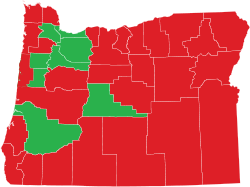- Oregon Ballot Measure 53 (2008)
-
Measure 53 Modifies provisions governing civil forfeitures related to crimes; permits use of proceeds by law enforcement. Election results Yes or no Votes Percentage  Yes
Yes489,592 50.03% No 489,042 49.97% Invalid or blank votes 191,892 19.61%% Total votes 978,634 100.00% Voter turnout 58.27%% Election results by county YesNoSource: Oregon Secretary of State [1]
Ballot Measure 53 was a legislatively-referred constitutional amendment ballot measure for the May 20, 2008 primary election ballot in the state of Oregon. The measure amended the Oregon Constitution and was narrowly passed by the voters after an automatically triggered recount was taken.Contents
Background
In November 2000 voters amended the Oregon Constitution by approving the ballot Measure 3, the Oregon Property Protection Act of 2000. The amendment imposed several restrictions on the ability of state and local governments to civilly forfeit property. This measure modified some of the restrictions on civil forfeiture of property.
At the time this measure was put forward, Oregon's constitution required that a person's property may be forfeited only if the person is convicted of a crime. In addition, the forfeiting agency must show by clear and convincing evidence that the property was an instrumentality of that crime, or proceeds of that crime.
This measure would allow civil forfeiture of instrumentalities and proceeds of other crimes that are similar to the crime that a person is convicted of committing, even though the person is not convicted of committing those other crimes. The measure required notice to the person and opportunity to challenge the seizure and forfeiture.
This measure also specified circumstances in which property may be forfeited without a criminal conviction. The measure would allow forfeiture if the person took the property with intent to defeat forfeiture, the person knew or should have known that the property constituted proceeds or instrumentality of criminal conduct, or the person acquiesced in the criminal conduct.
It also modified the standard of proof in civil forfeiture proceedings, requiring proof by preponderance of evidence to forfeit personal property, and proof by clear and convincing evidence to forfeit real property. The measure made an exception for cash, weapons or negotiable instruments found in close proximity to controlled substances or instrumentalities of criminal conduct, providing that claimant must prove by preponderance of evidence that the property is not subject to forfeiture.
The measure removed the prohibition on using forfeited property for law enforcement purposes, and removes the cap on the amount of property that may be applied against the costs of the forfeiture proceeding.
This measure made it so that forfeiture of animals were not subject to the Oregon Property Protection Act of 2000 and made various other housekeeping amendments to the act.
Estimate of Financial Impact
The direct financial impact of the measure to state and local governments was indeterminate due to the inability to accurately predict the number of civil forfeitures that may occur. If the frequency of civil forfeitures increases, then the amount of money going to the state and local jurisdictions would increase correspondingly. Any assets forfeited under the measure were distributed as follows: to the satisfaction of any foreclosed liens, security interests and contracts in the order of their priority; to the state or any of its political subdivisions for actual and reasonable expenses; and to the state or any of its political subdivisions for drug treatment programs. The measure would increase the revenue to the state and its political subdivisions, but the extent of the increase was unknown.[2]
See also
Notes
- ^ Bradbury, Bill (20 May 2008). "Official Results – May 20, 2008 Primary Election" (Website). Elections Division. Oregon Secretary of State. http://www.sos.state.or.us/elections/may202008/. Retrieved December 29, 2008.
- ^ Bradbury, Bill (20 May 2008). "Measure 53" (Website). Online Voters' Guide for the May 20, 2008 Primary Election. Oregon Secretary of State. http://www.sos.state.or.us/elections/may202008/guide/meas/m53_bt.html. Retrieved December 29, 2008.
External links
Topics in Oregon legislation Crime and sentencing Capital punishment · Measure 11 (1994) (mandatory minimum sentencing) · Measure 40 (1996) etc. (victims' rights) Abigail Scott Duniway was instrumental in establishing women's right to vote in Oregon.
Abigail Scott Duniway was instrumental in establishing women's right to vote in Oregon.
Elections and voting Gay rights Environment Land use Health care Minimum wage Taxation Tax revolt · Measure 5 (1990) (landmark tax law) · Measures 47 (1996) and 50 (1997) (adjusted Measure 5) · Kicker (tax rebate)Miscellaneous Influential people Background, further reading 2007 ← Oregon 2008 Elections → 2010 Categories:- Oregon 2008 ballot measures
- Amendments to the Oregon Constitution
Wikimedia Foundation. 2010.

